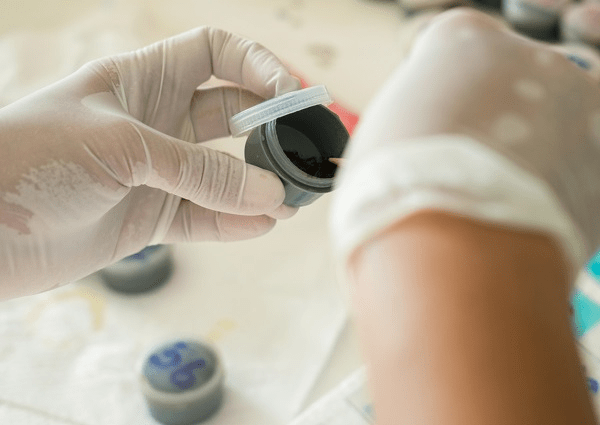Is Blastocystis hominis dangerous?

Blastocystis hominis is a parasite found in the feces of people who ingest contaminated food or water. Can be found in healthy individuals with no gastrointestinal symptoms. Sometimes found in the stools of people with diarrhea, abdominal pain, or other gastrointestinal problems. The role of Blastocystis hominis in pathogenicity is not clearly understood. Usually blastocystis just lives in a person's digestive tract without causing harm. So how to diagnose and prevent this intestinal parasite? Follow SignsSymptomsList to follow the article below to get the most accurate information.
content
- What are the signs of Blastocystis hominis infection?
- What causes Blastocystis hominis infection?
- What are the consequences of Blastocystis hominis?
- How to prevent the parasite Blastocystis hominis?
- What is the diagnosis of Blastocystis hominis infection?
- 6. How is Blastocystis hominis treated?
What are the signs of Blastocystis hominis infection?
- Watery diarrhea
- Nausea
- Stomachache
- Distention
- Flatulence
- Doesn't taste good
- Tired
See also: Acute Diarrhea: How to ask the doctor correctly?
What causes Blastocystis hominis infection?
Blastocystis is a single-celled parasite . Many protozoa that inhabit the gastrointestinal tract are usually harmless or even beneficial; Other species cause disease.

Most people carry Blastocystis but have no symptoms
Whether blastocystis causes disease is unknown. Most carriers have no symptoms. Parasites are also found in people with diarrhea and other digestive problems. Blastocystis is often detected with other microorganisms, so it is not known whether it causes disease.
Experts suspect that blastocystis enters the digestive tract when people eat contaminated food or come in contact with the feces of an infected person, such as when changing a baby's diaper. The proportion of microorganisms in feces increases when sanitary conditions are not adequate and personal hygiene is poor.
Blastocystis hominis is so common that anyone can have the parasite in their stool. You may be at higher risk if you travel or live in an area with inadequate sanitation or unclean water. Or contact with infected animals, such as pigs and poultry.
What are the consequences of Blastocystis hominis?
If you have diarrhea caused by Blastocystis hominis, the disease is likely to be self-limiting. However, whenever you have diarrhea, you lose body fluids and mineral salts, leading to dehydration. Children are especially susceptible to dehydration.
How to prevent the parasite Blastocystis hominis?
Be careful with what you eat
The general rule is: If you can't boil water or cook food, don't eat it.
- Avoid street food.
- Do not eat undercooked eggs.
- Avoid unpasteurized milk and dairy products, including ice cream.
- Do not eat undercooked meat, fish and shellfish.
- Stay away from foods with moisture, such as sauces and buffets.
- Eat foods that are cooked and hot.
- Eat fruits and vegetables that you can peel yourself, such as bananas, oranges, and avocados. Stay away from salads and fruits that you can't peel, such as grapes and berries.
- Avoid cold soft drinks and shaved ice.
- Do not use condiments made with fresh ingredients.

Be careful and limit eating raw and rare foods
Note about drinking water source
When visiting high-risk countries, keep in mind:
- Avoid drinking unfiltered water – from a tap, well or stream. If you need to drink water or wash fruits or vegetables, boil the water for at least three minutes and let it cool.
- Avoid using ice cubes or fruit juices made from tap water.
- Keep your mouth shut when showering.
- Use bottled water to brush your teeth.
- Make sure hot drinks, like coffee or tea, are still hot.
Drink canned or bottled beverages – including water, fizzy drinks, beer or wine. As long as you open them yourself. Wipe down cans or bottles of water before drinking.
You can disinfect water with iodine or chlorine. Iodine is generally more effective, but its use should be limited, as too much iodine can be harmful to health.

Use cooled boiled water to help limit germs
Be careful about transmitting parasites to others
If you have Blastocystis hominis or another gastrointestinal infection, good personal hygiene helps you not to infect others:
- Wash your hands with soap and water often, especially after using the toilet and before, during and after preparing food. Wet hands and lather up with soap for at least 20 seconds before rinsing. Rub the back of your hand and between your fingers. Dry your hands with a clean towel.
- If soap and water are not available, use hand sanitizer that contains at least 60 percent alcohol.
- Wash your hands thoroughly after changing a diaper, even if you're wearing gloves, especially if you work in a child care center.

Wash your hands thoroughly after changing your baby's diaper
See more: Tips for making simple hand sanitizer at home according to expert standards
What is the diagnosis of Blastocystis hominis infection?
The cause of diarrhea is difficult to diagnose. Even if Blastocystis hominis is found in the stool, it may not be the cause of symptoms. You may have come into contact with food or water contaminated with another microorganism that causes digestive symptoms.
Some tests help diagnose parasitic and other noninfectious causes:
- Stool test: Look for parasites or parasite eggs. Your doctor will give you a special container with liquid to store your stool sample. Refrigerate – do not freeze stool samples until you have brought them to the clinic or lab.
- Endoscopy: If you have symptoms but stool tests do not find a cause, your doctor will recommend a colonoscopy. After you're sedated, your gastroenterologist will insert a tube into your mouth or rectum to look for the cause. You will need to fast before the test.
- Blood tests: Blood tests that can detect blastocystis are available but are not commonly used. However, your doctor may order blood tests to look for other causes of your signs and symptoms.
See also: 10 important blood test indicators you need to know
6. How is Blastocystis hominis treated?
If you have Blastocystis hominis without symptoms, no treatment is needed. Mild symptoms may improve on their own within a few days.
Medications that are effective for treating Blastocystis hominis include:
- Antibiotics: such as metronidazole (Flagyl) or tinidazole (Tindamax)
- Combination drugs: such as sulfamethoxazole and trimethoprim (Bactrim, Septra, others)
- Antiprotozoal drugs: such as paromomycin or nitazoxanide (Alinia)
Response to treatment for Blastocystis hominis varies from person to person. Since parasites may not be the cause, the improvement in symptoms may be due to the drug's effect on other microorganisms.

Infection with Blastocystis hominis should be prevented to limit disease
Intestinal parasitic infections caused by Blastocystis hominis are still poorly understood. But preventing infection with Blastocystis hominis also helps prevent other parasites that can cause disease. If you have symptoms, such as diarrhea or cramps that last for more than three days, see your doctor for guidance and treatment to avoid infecting others.